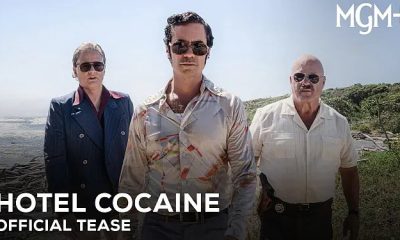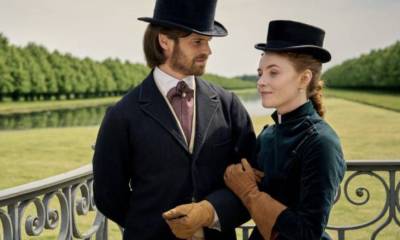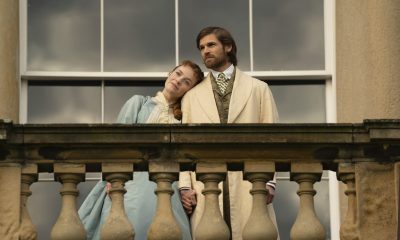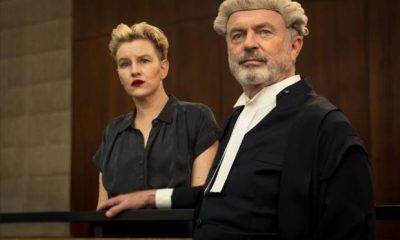Features
How J. Arthur Rank Saved The Post War British Film Industry
The late Forties were years of success and optimism for the British cinema and two moguls, Korda and Rank, fought for the rich rewards offered by the American market.
The British film industry entered the post-war period in a spirit of optimism. Annual attendances at British cinemas in 1946 was at an all-time high with over a billion tickets sold. That statistic is all the more remarkable since, out of 5000 cinemas, as many as 230 remained closed owing to bomb damage and because the limited supply of building materials was reserved for more essential uses, no new cinemas could be built.
It was not until April 1949 that cinemas were allowed to switch on their front-of-house display lighting once again. But despite a certain dinginess, the cinema was still an attractive escape from the austerity of post-war Britain with its fuel crises, rationing and various other shortages.
The major cinema circuits – Odeon and Gaumont (both controlled by J. Arthur Rank) and the rival ABC (Associated British Cinemas) were prevented from further expanding their share of the market by the Board of Trade. It was a time for smaller companies like Granada, Southan Morris and Star to expand by taking over independent cinemas. The biggest single growth, however, occurred in Sol Sheckman’s Essoldo circuit which more than tripled in size between the end of the war and the end of the decade.
The traditional low esteem accorded to home produced films by British audiences had vanished. J. Arthur Rank, an established producer in the late Thirties, was encouraged by the popularity of such pictures as Madonna of the Seven Moons (1944) and A Place of One’s Own (1945) and embarked on a great crusade to put British films on an equal footing with Hollywood product throughout the world. There were new markets to be won in the formerly occupied countries, long deprived of Hollywood and British films, and Rank’s salesmen were there, trying to earn money vital to Britain’s post-war economy.
Would Be Conquest of North America
Rank also had his eye on the lucrative North American market. In 1944. he bought a half-interest in the circuit of 80 Odeon cinemas in Canadá, and a year later he was contemplating building a new Odeon to seat 2500 people in New York’s Times Square.
Rank was the largest shareholder in Universal pictures and set up a new company in partnership with them to distribute eight Rank pictures a year in North America. These films were block-booked with new Hollywood films to make a package acceptable to the American circuits. But the US government had for some time been opposed to the system of block-booking and Rank was forced to change his plans. He eventually persuaded the five major American circuits to book British pictures on their own merits.
Britain could not afford to let all the money earned by Hollywood films in the UK leave the country – unless British films could earn more money in the USA to help redress the balance. At the same time the British market was vital to the American studios. In 1946 for example it was worth $87 million and provided 60 per cent of their foreign income.
The American circuits were controlled by the big Hollywood companies who realized that they would have to play their fair share of British films in order to keep their side of the bargain. Expensive and prestigious Rank productions like Henry V (1944) and Caesar and Cleopatra (1945), as well as the more modestly budgeted The Seventh Veil (1945), were already making inroads into the American market.
In 1946 six British pictures shared 11 Academy Award nominations. Among the Oscar winners were Laurence Olivier, with a special award for Henry V, Clemence Dañe for the story of Perfect Strangers (1945) and Muriel and Sydney Box for their original screenplay for The Seventh Veil. Success in America continued into 1947 when Rank’s production of Great Expectations (1946) played at the mighty Radio City Music Hall in New York, and Odd Man Out (1947) appeared at another important Broadway cinema. The following year Hamlet (1948) won the Osear for Best Picture and Best Actor, marking further triumphs for Olivier. The Red Shoes (1948) was also nominated for Best Picture. Hollywood smarted under charges that it was losing its artistic initiative.
Rank built up his British studio on Hollywood lines. He established an animation unit with David Hand, a recruit from Disney: He started a two-reel documentary series This Modern Age to rival the March of Time and he founded the ‘charm school’ at his Highbury studios to develop new talent.
As an exhibitor, Rank extended his empire. By the end of 1947, he had an interest in 725 overseas cinemas with more than a hundred in five countries – New Zealand, Canada, South África, ltaly and Australia – and strong representation in Eire, Ceylon, Holland, Egypt, Jamaica and Singapore. In Britain. his two cinema circuits formed the prime outlet for the Hollywood majors (except Warners and MGM who had distribution ties with the ABC circuit) and at the same time Rank was programming British cinemas with his own films.
ABC had no overseas cinemas and were, therefore. a smaller concern than Rank. Furthermore they were substantially owned by warner Brothers and had no-one of J. Arthur Rank’s drive and zeal at the helm.
The Korda Connection
The only potential opposition to Rank’s dominance of the British film industry was Alexander Korda, but he did not have the benefit of a cinema circuit. During 1943—45. Korda worked in association with MGM but only produced one picture, Perfect Strangers and the chance to curb Rank’s power was lost. MGM called off their deal with Korda: he re-established London Films and took over Shepperton studios.
Korda never became a prolific producer on the scale of J. Arthur Rank. In 1948, he was in severe financia! difficulties following losses on two very expensive pictures, An Ideal Husband (1947) and a new version of Anna Karenina (1948). His extravagant spending on Bonnie Prince Charlie (1948), filmed over nine months, only made matters worse.
Fortunately. productions like Mine Own Executioner (1947) and The Winslow Boy (1948) were more economically filmed and Korda’s company made some profit from distributing several of the upper-class romances that Herbert Wilcox produced and directed starring his wife Anna Neagle and Michael Wilding. These films, The Courtneys of Curzon Street (1947), Spring in Park Lane (1948) and Maytime in Mayfair (1949), reflected Wilcox’s opinion that audiences were sick of gloomy horrors and wanted films about nice people.
Gainsborough, Cineguild and Associated British
Associated British had some successes with the Boulting Brothers’ production of Brighton Rock (1947) and My Brother Jonathan (1948). The first of these was adapted from Graham Greene’s crime thriller and starred Richard Attenborough as the teenage gángster Pinky: and the second film had Michael Denison playing an ambitious young doctor in a northern industrial town.
Rank also backed the independent producers’ company Cineguild, formed in 1942 by David Lean. Ronald Neame, Anthony Havelock-Allan and Noel Coward. It was this team that produced This Happy Breed (1944), Blithe Spirit and Brief Encounter (both 1945). David Lean directed all three films and went on to make his two celebrated adaptations from Dickens, Great Expectalions and Oliver Twist (1948), under the Cineguild banner.
Gainsborough, the production company of the Gaumont empire, specialized in costume melodramas about gypsies, bandits and brutality featuring such stars as Margaret Lockwood, James Mason and Stewart Granger. Despised by the critics, films like Fanny By Gaslight (1944), They Were Sisters and The Wicked Lady (both 1945) and Caravan (1946) were adored by the public. Thereafter, Gainsborough appeared to lose its popularity and eventually the company ran into financial losses with Christopher Columbus (1949), a tedious historical drama starring Fredric March as the intrepid explorar.
Michael Powell and Emeric Pressburger, one of the most prolific production teams of the period, formed their own company. The Archers, which was also backed by Rank, and released their idiosyncratic, widely discussed films: I Know Where I’m Going (1945), A Matter of Life and Death (1946), Black Narcissus (1947) and The Red Shoes (1948).
Frank Launder and Sidney Gilliat’s Individual Pictures company (also linked to Rank) made a number of accomplished films that brought credit to the parent company: The Rake’s Progress (1945), I See a Dark Stranger (1946) and The Blue Lagoon (1949). The latter film was handicapped by interference on the part of Rank who insisted that it be shot in the studio rather than on location, thus forcing the film beyond its budget.
The Rank Monopoly
One of the fiercest critics of Rank’s monopoly was Michael Balcon, the production chief and head of Ealing Studios, but even he was obliged to turn to Rank for distribution from 1944 onwards. The immediate post-war period was not a notable time for Ealing despite the critical successes of Dead of Night and Pink String and Sealing Wax (both 1945) and the acclaim given to Hue and Cry and It Always Rains on Sunday (both 1947). But in 1949 the company brought out Passport to Pimlico, Whisky Galore and Kind Hearts and Coronets in rapid succession. The era of Ealing comedy had truly arrived at last.
Rank was making headway as an independent businessman selling his films in the USA when the British government intervened and placed a 75 per cent ad valorem tax on American films imported after August 1947. The result of this measure was twofold: Hollywood stopped sending new films to Britain and American circuits were no longer disposed to show British films. Overseas sales, like those that Rank was pursuing, became harder to achieve. In Britain. cinemas were soon reduced to playing reissues of oíd films and to extending the runs of new British films. By the spring of 1948 the film business was in a bad way.
Rank’s response to the crisis was to launch a crash programme of production at a cost of over £9 million, drawing on the spare funds of his highly profitable Odeon circuit for the first time. But the new Rank pictures spread the available talent too thinly and the quality of these films was not high enough to guarantee profits. At the same time, the Chancellor of the Exchequer, Sir Stafford Cripps, arranged for the original import tax on Hollywood films to be repealed in May 1948 in exchange for an agreement on the part of the Americans to limit the amount of earnings removed from the country to an annual figure of 17 million pounds. The remainder of this revenue was to be reinvested in British film produetion. Hollywood, not surprisingly, unleashed a backlog of 265 pictures and the new British films were swamped under the competition.
Once again the government tried to take remedial steps. It raised the quota of British features to be shown in cinemas throughout the land from 20 to 45 per cent. The new figure made impossible demands on the British film industry even though Rank kept up production in an attempt to fulfil the quota. Hollywood was once again handicapped as the various studios scrambled for the limited playing time the new British law left them.
The Downward Spiral
In the summer of 1949 Rank’s £86 million empire had a £16.25 million overdraft and had lost £3.35 million in production, resulting in an overall year’s trading loss of £750,000. Rank ordered savage cut-backs. No future Rank film was to cost over £150,000 – a far cry from the half- million spent on the two Olivier/Shakespeare films. Rank stopped making cartoons, terminated This Modern Age, closed the studios at Highbury (and the ‘charm school’), Islington and Shepherds Bush and cut back on production activity at Denham.
Pinewood was to be the main base for Rank production but the economies had forced many film-makers away, most of them joining up with Korda, a popular and cultured figure with whom artists felt at home.
Investment in production was no longer the attractive gamble it had been to financiers in the Thirties. Instead the government of the day created the National Film Finance Corporation which began in October 1948 with £5 million to loan to producers who proposed safe-looking projects for films. Rank made no attempt to borrow NFFC money, not wanting to mercase his organization’s debts, but Alexander Korda seized the opportunity and borrowed £3 million for a variety of productions.
The money gave Korda a new lease of life. He engaged Carol Reed to make The Fallen Idol (1948) and The Third Man (1949). The latter film was partly financed by the Hollywood producer David O. Selznick who supplied Joseph Cotten and Alida Valli from his roster of stars. Selznick also collaborated with Korda on Powell and Pressburger’s Gone to Earth (1950), a melodrama set in the Shropshire countryside with spectacular hunting scenes. This film prompted an argument between Korda and Selznick over the quality of the close-ups of Jennifer Jones and Selznick had the scenes featuring Jones reshot in the United States before releasing the film as The Wild Heart.
Associated British responded to Rank’s cut-back with the announcement of a major production programme in association with Warner Brothers. One of the products of this collaboration was The Hasty Heart (1949) starring Richard Todd.The film was directed by Vincent Sherman from a script by Ranald MacDougall and co-starred Patricia Neal: all three were Warners stalwarts from Hollywood. Associated British also drew on Hollywood talent for their lavish, American-style musical Happy-Go-Lovely (1951): the film was directed by H. Bruce Humberstone and starred David Niven, Veragüen and Cesar Romero.
Other Hollywood companies were actively involved in British production, using up some of the frozen assets created by governmental restrictions. 20th Century Fox made Escape (1948) and Britannia Mews (1949), a period romance written by Ring Lardner Jr. In 1949, MGM filmed Edward My Son and the Cold War thriller Conspirator, starring Robert Taylor and Elizabeth Taylor, as well as establishing its own studio at Borehamwood.
At the end of the decade, the British film industry was badly battered. The high hopes of the post-war revival were dashed. In 1949, the government set up the British Production Fund which has always been known as the Eady Plan after Sir William Eady who devised the scheme. Briefly, the fund was the product of a levy on the price of cinema admission which would be returned to producers in direct proportion to the performance of their films at the box-office. The Eady levy placed a premium on financial success and British film producers felt it keenly. In the same year as the Eady Plan was introduced the government reduced the quota of British films exhibitors were obliged to play to 40 per cent. This move may have eased the pressure on British production but the industry would never again enjoy the financial stability of the mid-Forties.




















































